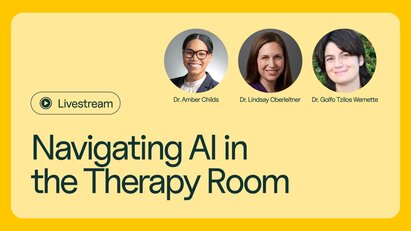Navigating AI in the Therapy Room

Published November 21, 2023

State licensure doesn’t need to be the mechanism by which mental health professionals are deemed worthy to practice forever. This ebook examines a number of potential alternative structures to the current practice of state-based licensure.
These potential alternative structures represent varying degrees of structural shifts to how new therapists are authorized to provide services. They also seek to resolve some of the current issues with state-based licensure without compromising high professional standards and mechanisms for public protection. This ebook doesn’t advocate for any specific structure, but rather aims to inform readers of the possibilities for professional credentialing structures in mental health care.
For decades, state licensure has been regarded as a key marker of legitimacy for mental health professionals. More than 500,000 US mental health professionals hold state licenses in the fields of psychology, clinical social work, counseling, and family therapy. Licensure continues to grow and expand as more fields—including art therapy, substance-abuse counseling—seek state licensure around the country.
Most state licensure laws serve two distinct legal functions—title protection and practice protection. Title protection ensures that no one can use a professional title like “psychologist” in marketing services to the public unless that person holds the appropriate license. This helps create a clear and consistent public understanding of what that title means. Practice protection ensures that no one can perform services as a mental health professional unless that person holds an appropriate license. Even someone calling themselves a “coach” or “consultant” may still face legal action for practicing without a license if they asses, diagnose, or treat mental illness within their work.
In order to earn state licensure, mental health professionals typically must successfully complete—a graduate degree, supervised experience, and licensure exams. Given these common requirements, many professionals understandably wonder why state licensure couldn’t be replaced with a national licensure. However, this appears to be precluded by the US Constitution, which generally leaves the regulation of intrastate commerce up to the individual states.
Since each state has developed its own licensure standards, minor differences between states often make it difficult for a professional to move from one state to another, or to continue working via telehealth with a client who travels to a different state.
While state licensure is widely regarded as the industry standard, it’s also been criticized as a system that limits mobility, raises prices, and limits customer choice—without public benefits.
A 2015 government report noted that occupational licensing can inhibit innovation. This system also has outsized negative impacts on military spouses, immigrants, individuals with criminal records, and other marginalized groups.
State licensing boards are also sometimes seen as worthwhile targets for government cost-cutting efforts. Several state lawmakers have proposed combining or eliminating state mental health licensing boards in recent years. The professions regulated by these boards have been able to mount successful advocacy efforts to preserve their boards, but such efforts take time and resources away from the other advocacy goals.
Some mental health professionals see the regulations imposed by their licensing boards are stifling creativity and innovation in their clinical work, and prefer to conduct that work outside of licensure. Many appear to be turning to professional coaching, which doesn’t use protected titles, and seek to remain outside the scope of practice of licensed mental health professionals.
In short, policymakers and mental health professionals are questioning the supposed benefits of licensure, and reconsidering whether those benefits outweigh the drawbacks of regulating mental health professions through occupational licensing.
There’s a reason we have the licensure system we have today, but intentions don’t always yield the desired results. State-based licensure was intended to protect the public, uphold a certain professional standard, establish stature within the industry, boost professional pay, create a framework for insurance reimbursement, and control who enters the profession.
To learn more about the intended benefits of licensure and why the current system is broken, download our free ebook today.
SimplePractice is HIPAA-compliant practice management software with everything you need to run your practice built into the platform—from booking and scheduling to insurance and client billing.
If you’ve been considering switching to an EHR system, SimplePractice empowers you to streamline appointment bookings, reminders, and rescheduling and simplify the billing and coding process—so you get more time for the things that matter most to you.
Try SimplePractice free for 30 days. No credit card required.
Proudly made in Santa Monica, CA © 2025 SimplePractice, LLC
Proudly made in Santa Monica, CA © 2025
SimplePractice, LLC